By Thapelo Matlala
When it rains it pours. Rhodes University students came out in their hundreds to attend a shutdown of the university on 8 and 9 May, which began at 5am on 8 May in Somerset Street. Local residents, and organizations like the Unemployed People’s Movement (UPM) and Makana Citizen’s Front (MCF) and religious leaders from the College of Transfiguration came out in solidarity with the students, protesting against the Makana Municipality’s inability to render quality water services.
Rage was an understatement to describe the atmosphere of the scene, with students chanting at the top of their lungs, and barricading the university’s entrances. Cars, delivery scooters and catering staff were denied access to the university and had to return back. Students who live off-campus also came out in support.
Students’ hygiene struggle during watershedding
One of the concerned off-campus students, Vilia Dube said “I stand here in unity with my fellow students’ to show the university that we are serious about our frustrations. We do not have water on campus, we are struggling with hygiene and in as much as loadshedding is a national crisis, the university has generators that are taking time to kick in. Some of us do not have electricity in the certain parts of the labs and exam season is coming up.”
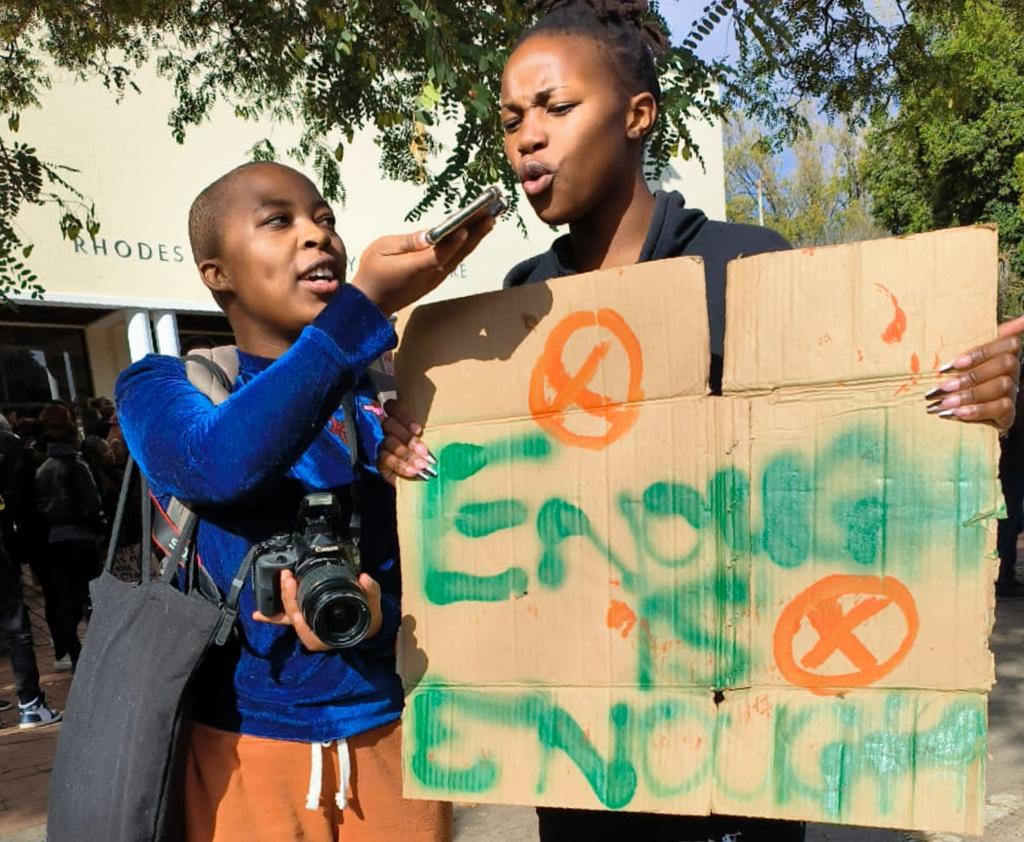
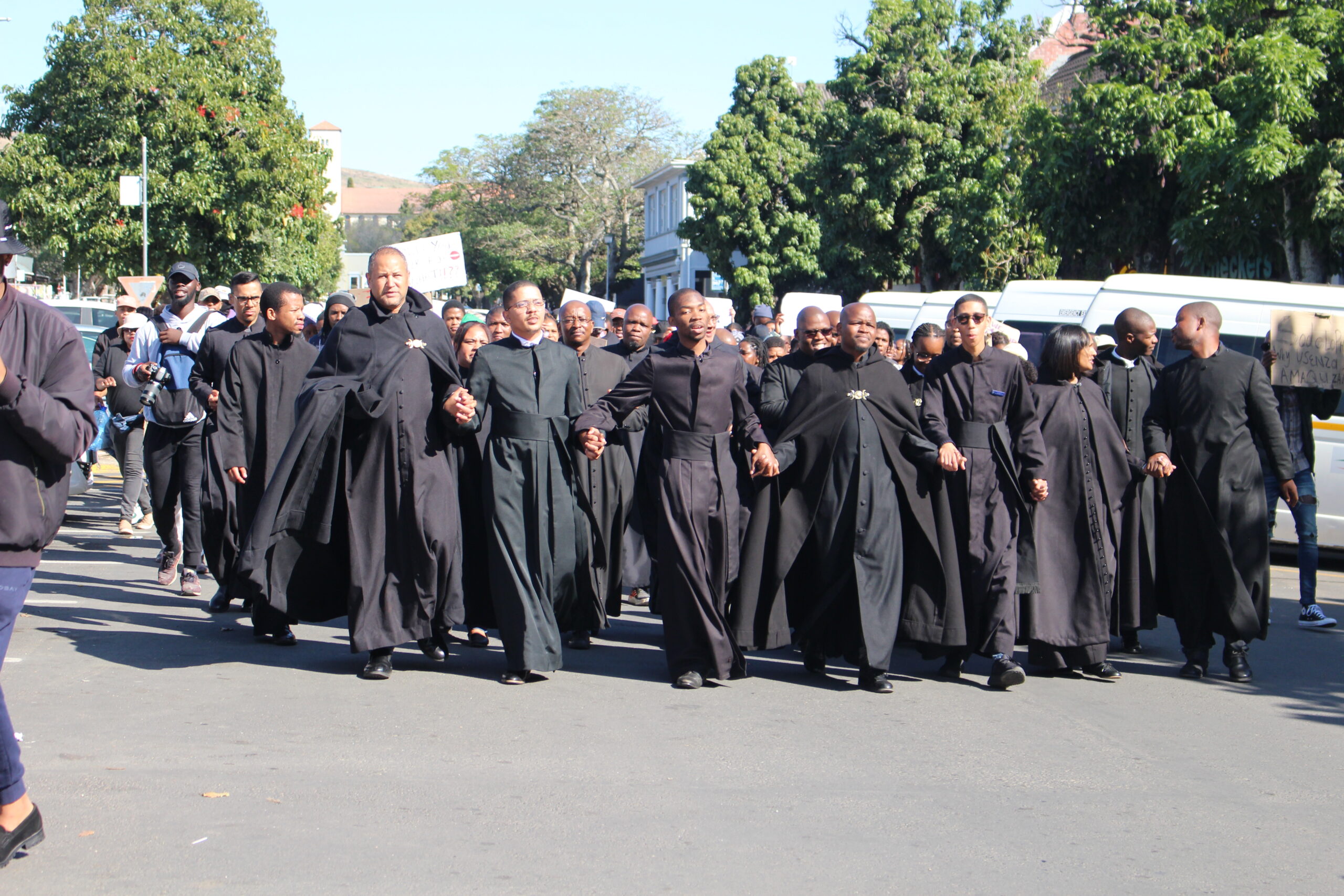
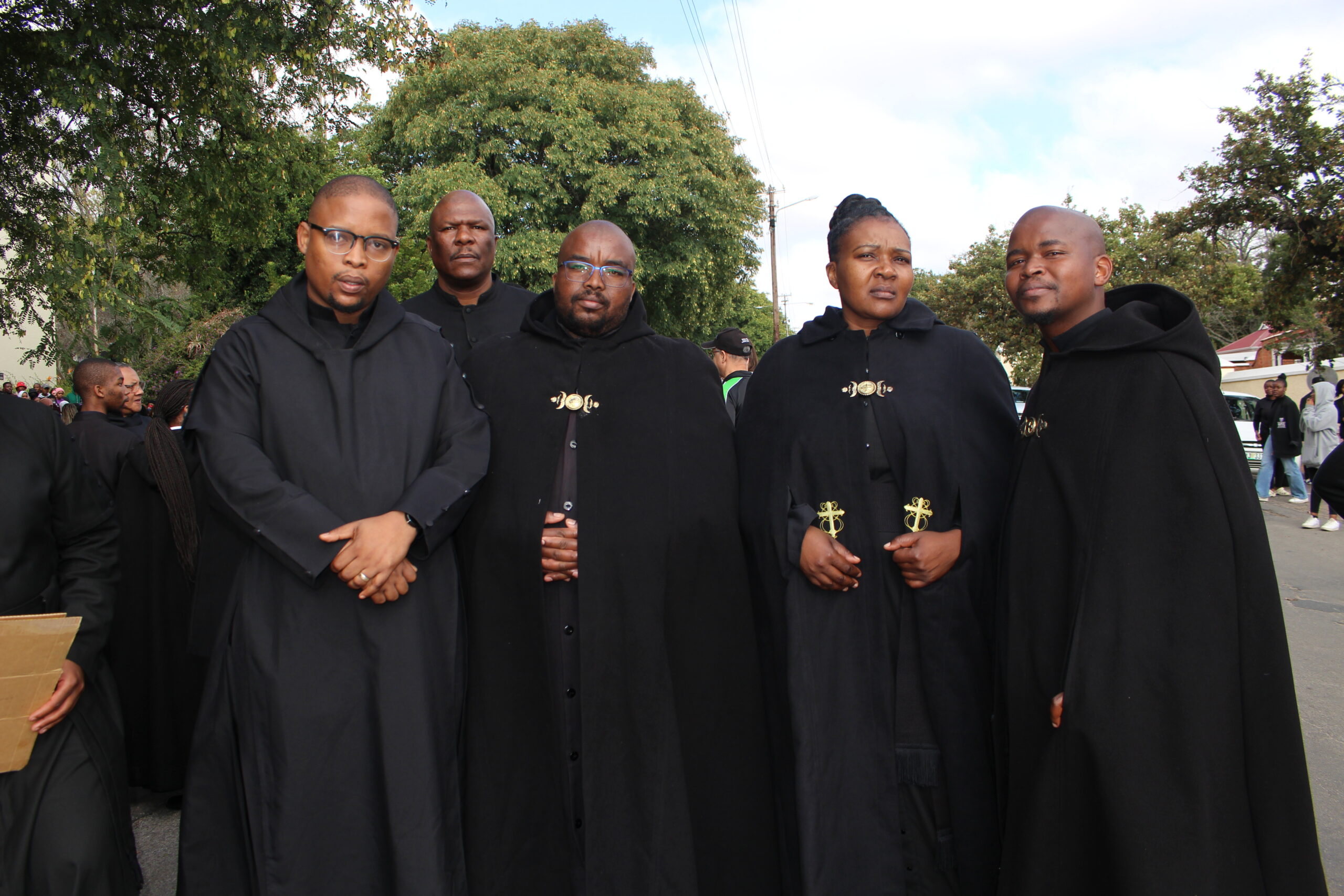
Religious leaders from the College of the Transfiguration Anglican Seminary also came out in support of the shutdown. The College’s spokesperson, Xhanti Marubelela, said they decided to avail themselves because they are also experiencing the negative effects of waterless days. Marubelela said although they are men and women of the cloth, they are not isolated from this situation but are part of it. In showing this unity, they hoped the strike would achieve it’s mandate of compelling the municipality to improve the water supply to the town.
“Our municipality is failing us 100%” – resident
Community members also joined the shutdown. Monica Solomon of KwaThatha, said “we have a problem with water because we haven’t been receiving it for two to three weeks. We are struggling. My parents are old and where I stay, we have mostly elderly people who don’t have water tanks. Our municipality is failing us 100%. It’s been for the longest time that they said they are fixing a valve, but we don’t see any progress. Roads are full of damn holes and there is nothing that seems okay. We plead with the municipality to employ people who can relate to our struggles so that they can fulfill their duties,” said Solomon.
Nomathamsanqa Budaza who says she has spent most of her years in the township in Makhanda, added “We are most concerned about water, and we decided to join the students because an injury to one is an injury to all”.
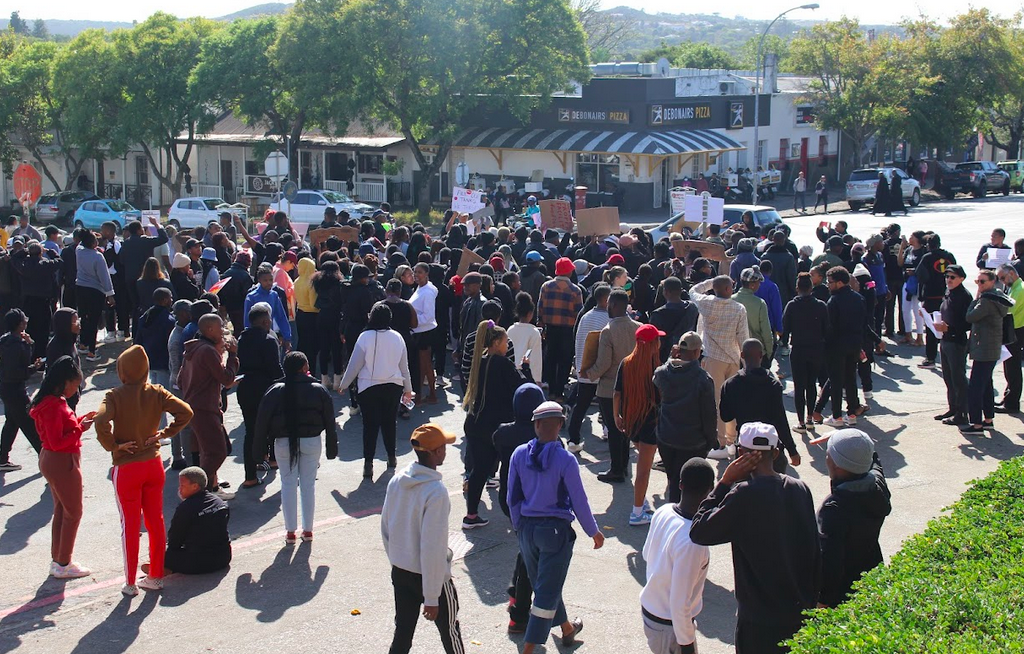
No water for a month – and sewage problems too
Resident Shirley Pinchuck added: “I agree that service delivery should be happening. I’ve had no water for a month. This is the time to voice out and be heard”.
Another resident, Nomakhosazana Bhudaza, said she was glad to have an opportunity to go on strike for water. “We also have sewage impediments that are not being fixed. Right now, we are tired. Enough is Enough!” Budaza said. She added that she and her neighbours are forced to drink dirty water, and often go without water for five days at a time.
“We only get the chance to access water at 3am – it comes on while we are still asleep. Then we check our water taps in the morning, and find there is no water. This is caused by the municipality,” said Budaza. She added that she would be more than happy if water could run from the taps all week as it did in the past.
“They have been telling us about these pumps that they are fixing, but they are not getting fixed. Because we are striking there is water now, but after the strike, you will find that there is no water. I would love to see the strike continuing for three days so that our demands can be heard,” she added.
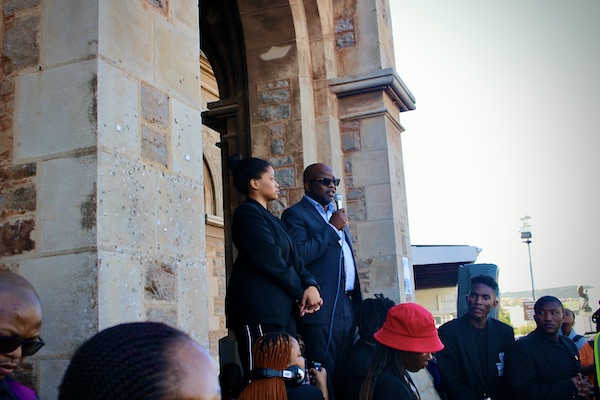
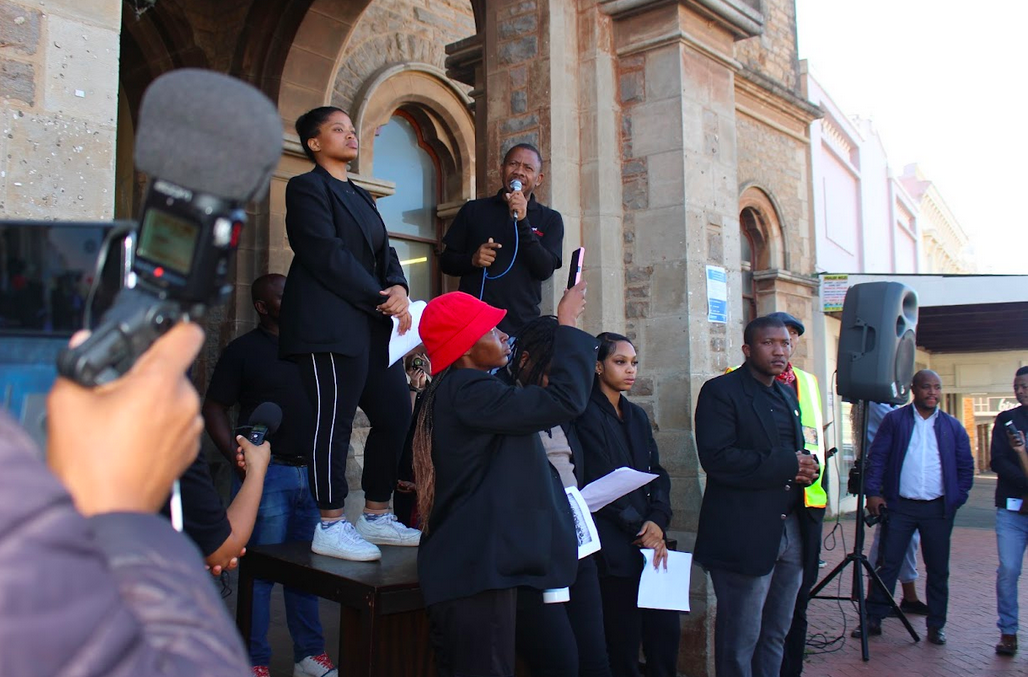
In the afternoon on the first day of the shutdown, the protestors rushed up to the City Hall demanding a talk with the Mayor, which didn’t happen. Instead, municipal manager Phumelelo Kate came out to receive a memorandum from the frustrated residents and students.
Same old excuses from Municipal Manager
“We have received the petition today from the community of Rhodes University together with our communities from all the settlements of the Makhanda area. The issue is that we all know that the municipality has been struggling to deliver water on a 24-hour basis, due to the infrastructure that cannot provide the water to that extent. We know that Makana is reliant on two streams of water, one from James Kleynhans area as well as from Waainek Water Treatment Works” said Kate.
He then repeated the rationale for water shedding that the municipality had provided during the Integrated Development Planning meetings with communities earlier this year, saying that water cuts were taking place because the James Kleynhans water treatment works could not currently supply enough water to residents of the town every day. Kate said again that that once the James Kleynhans upgrade was complete, it would be able to supply 20 megalitres of water per day (20 million litres) – enough for the town to have water every day.
“What has exacerbated the situation is the fact that the Howieson’s Poort dam, which provides water to one of our critical water treatment plants, which is Waainek, is offline due to problems that we are currently investigating. So we are currently reliant now on only 10 megalitres of water per day (from James Kleynhans),” said Kate.
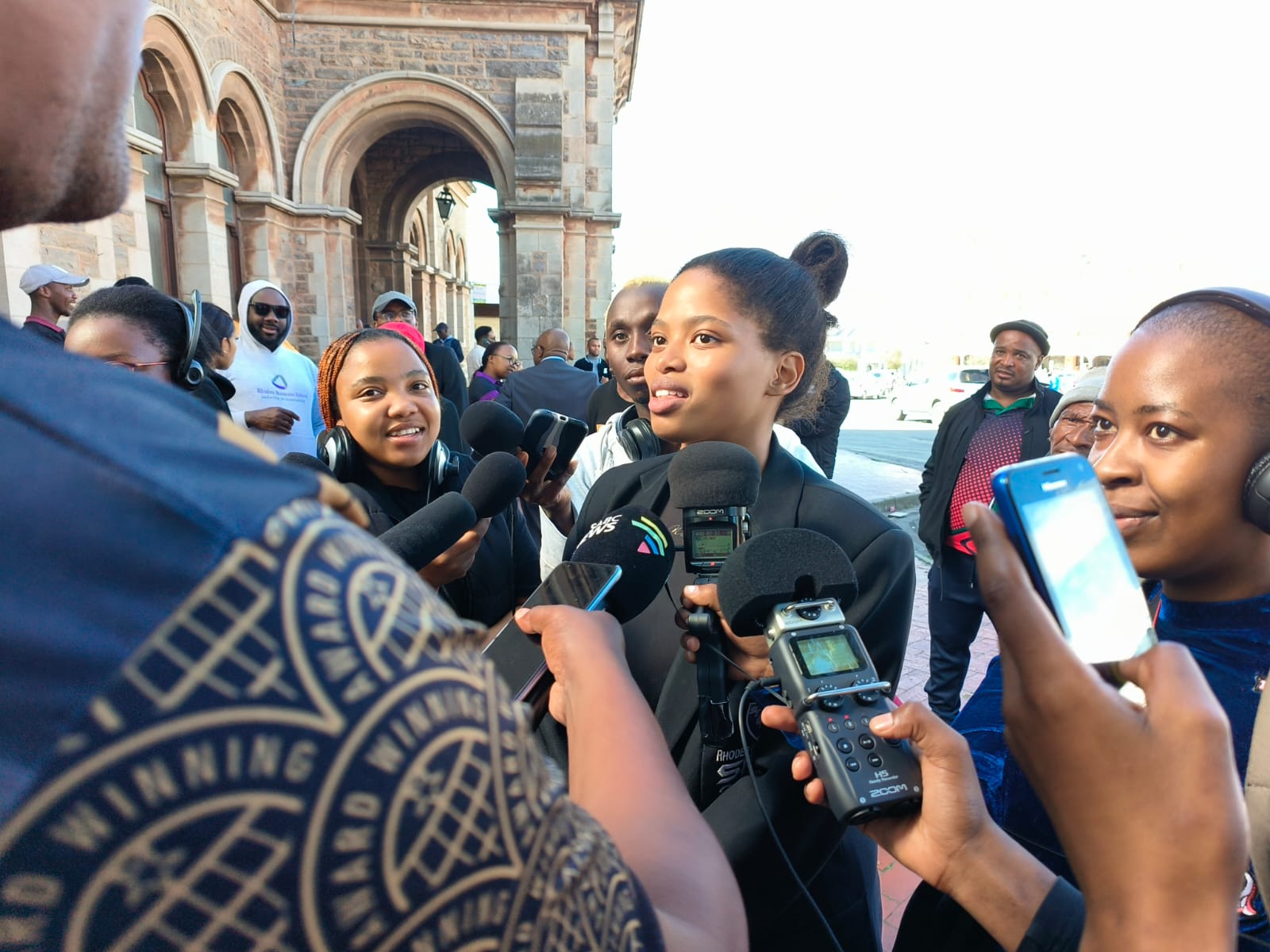
SRC gives municipality seven days to respond to demands
Rhodes University SRC president, Avuxeni Tyala also addressed protestors, saying “we can’t bathe, our toilets are blocked, the sewage pipes are stuffed. You can’t even put the frustration to words” she said, adding that the students would give the municipality seven days to respond to their demands for clean, running water at all times. “If the situation doesn’t change, we will meet with the relevant stakeholders and continue with the strike until we get the answers we want. This has been an ongoing issue because we can’t even proceed with a day-to-day basis without water,” said Tyala.
UPM and MCF activist Ayanda Kota told the protestors at City Hall that the gathering was politically significant and historic because students were able to join hands with the community. “The students are catalysts of change and agents of change. When students stand up in a society and raise their voices, we know that change is inevitable. So this is an act of solidarity, propelled by the act of love. It is only through solidarity that we will be able to affect change,” said Kota.
“We are also sick and tired of technocratic, useless and pointless explanations and justifications. We want water, and water is our Constitutional right. It is a disgrace that after 29 years of democracy we are still denied water,” Kota added.
Schoolteacher and MCF and UPM leader, Nosigqibo Soxujwa, also addressed protestors, describing an elderly person on medication without children in her area, who has nobody to run after the water truck when it arrives. Such people miss out on getting water altogether, Soxujwa said. She added that females in general are unable to maintain proper hygiene when water is cut off for so long.
Also at the shutdown, Anelisa Bentele, co-director of the Isikhalo Womxn’s Movement against Gender-Based Violence says she cannot stand the “inconsistent and improper communication” that Makana municipality sends out about watershedding. “As women, we need water to cook and bathe our kids. Everything that we do, such as flushing our toilets and being a woman is challenging, because we can get infections from not flushing our toilets. It is sad that we spend about three days without running water. We are here to support the Rhodes SRC because this is something that affects us all in Makhanda,” said Bentele.
By 9 May, the protesting groups had agreed to adjourn the shutdown and by 10 May, Parliament’s Portfolio Committee on Cooperative Governance and Traditional Affairs had spoken out about the matter, saying that the water crisis in Makhanda was 10 years old and needed to be speedily resolved.


